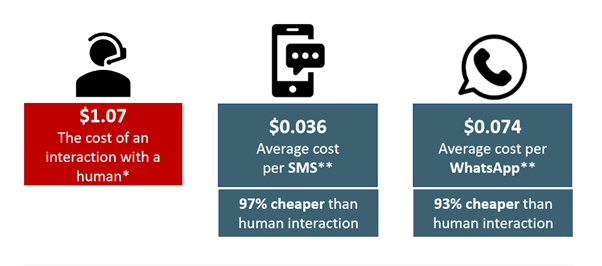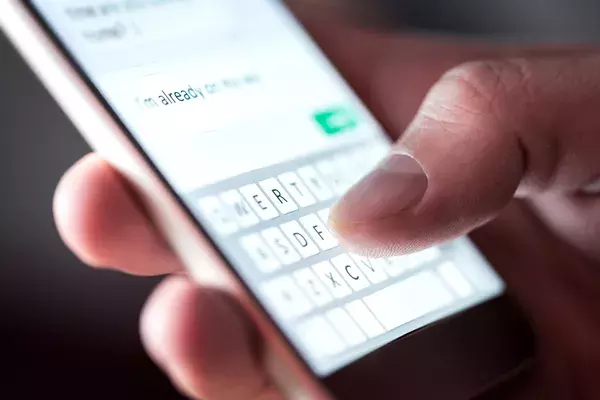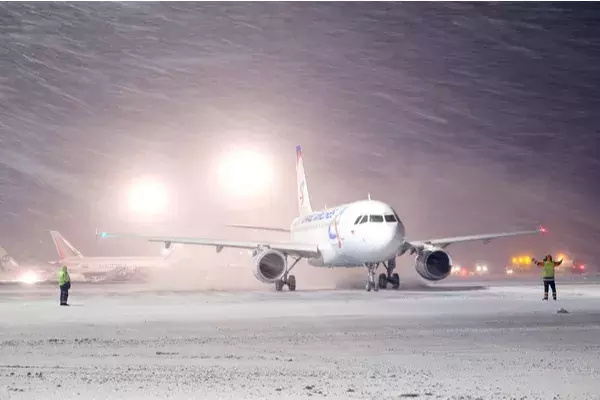01 December 2020 | Blog
Use SMS to reduce your communication costs by 97%
01 December 2020 | Blog
Use SMS to reduce your communication costs by 97%
The travel industry has always come under scrutiny, accused of being behind the times when compared with how other industries manage customer experience. With antiquated legacy systems, travel companies have not been able to advance at the rate of those with wider profit margins that can afford to invest more heavily in their technology.
That said though, there are things that travel companies can do to combat the criticism, despite the challenges their old-fashioned systems pose. One thing that has always had – and will continue to have – a big impact on customer perception is proactive, personalised communication.
“If communication doesn't work, everything else goes to waste.”
Tosho Trajanov, CTO at Adeva
Direct operational communication via SMS is used across pretty much every customer-facing industry imaginable…
Retail
“Your order is ready to collect. Please bring ID and wear a face mask.”
Medical
“Your appointment is tomorrow at 10am. The waiting room is closed - please don’t arrive too early and bring a face mask.”
Restaurants
“Your table is booked for tomorrow at 9pm. Please reply “yes” to confirm or “no” to cancel.”
Events, Hospitality, Beauty, Couriers, Banking…the list goes on.
The issue with not keeping people informed with operational communications in this way is that the fallout is too costly to imagine. Hotel rooms that should have been cancelled and remain empty, stock that could have been sold to someone else, a patient that turns up without a facemask and has to rebook… and then the cost of the backlash online when customers use the megaphone-effect of social media to warn others of their poor experience with the brand.
In fact, the outlay for sending these operational messages via SMS or social messaging is insignificant when compared with the hidden costs that a business incurs due to a lack of communication. And that’s why these industries consider SMS essential to smooth operations, revenue generation, and reputation management.

If it works for every other industry, why have travel brands been so slow to adopt the channel?
“If they haven’t done so already, brands must invest in AI-driven solutions that deliver highly personalized conversations at scale. And CX leaders must think beyond simple, scripted chatbots to what will drive customer loyalty over the full customer journey. How can we help customers before they arrive in store? Anticipate questions before they surface? Send notifications that are welcome rather than intrusive? Next-generation conversations are intelligent, welcome, and highly useful.”
CUSTOMER EXPERIENCE IN A TRANSFORMED WORLD - Sinch
If you currently rely on email alone to let your passengers know about the need for a covid-19 test, new track and trace requirements, or that wearing a face mask in the airport is mandatory, the likelihood is that you will at best have a lot of calls coming into your contact centre, or at worst, a lot of confused, stressed, and angry passengers to deal with at the airport. All to save the cost of a text message.
When you add SMS into your communications workflow, rather than relying on your airport and contact centre staff to communicate simple messages to passengers, you can expect your costs to come down by an incredible 97%.

*Calculated as average salary of a contact centre agent or airport staff divided by 250 working days per year and 100 interactions per day
**Average cost of sending a message to UK, USA, France, Australia, Singapore, Mexico and Philippines
At a time when budgets are being scrutinized more than ever, we know travel companies are looking for new, innovative ways to bring costs down. So, if you’re under pressure to cut your communication expenditure, take a look at our guide on the Power of SMS. It’s filled with great stats, and insights on why introducing SMS into your business is the wisest financial decision you can make.




